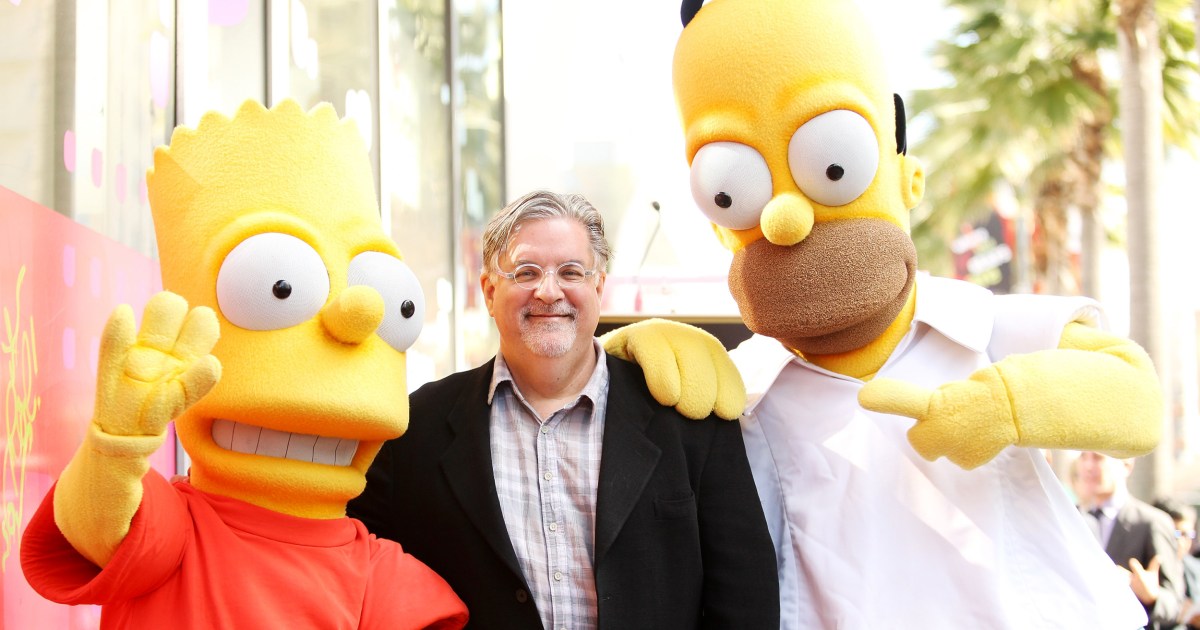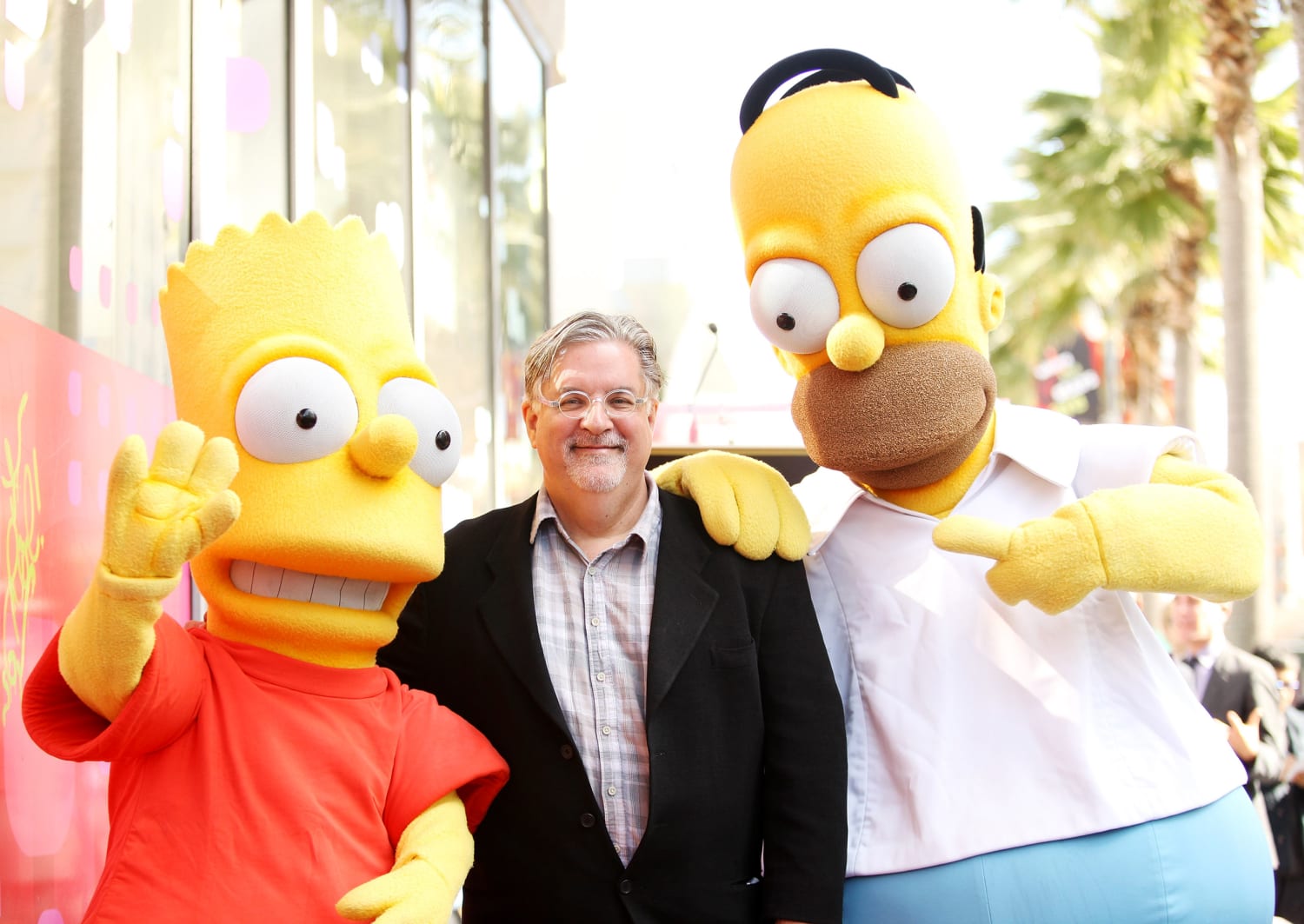
“The Simpsons” has changed. The show takes plenty of knocks for misbegotten portrayals of ethnic and sexual minorities, which creator Matt Groening acknowledged in a recent interview with BBC News on the topic, and it has shifted dramatically over the years, both with the times and in response to those criticisms. But in part because of its warts, it’s a remarkable history of the end of the 20th century.
Rewatching decades’ worth of “The Simpsons” over the course of a few months (which I’ve been doing, now that all 32 seasons of the show (except the Season 3 premiere, “Stark Raving Dad,” guest-starring Michael Jackson) are on Disney+) is a strange and mostly wonderful experience. It often involved reliving forgotten viral news stories mentioned by the show obliquely or in parody — like “Bart vs. Australia,” in which Bart is sentenced to be “booted” by the Australian prime minister, an episode-long travesty of a news story about American teenager Michael Fay who was caned by Singaporean authorities as punishment for vandalism.
Weekly television sitcoms were never intended for archival preservation; many of the earliest shows had their tapes reused, their originals lost in studio fires, or were just thrown in the trash. But fairly early into its historic run, “The Simpsons” became something that its fans wanted not just to discuss, but to retain. More than any other show, it has one foot in the era of disposable television and the other in our current re-viewing culture. It’s an incredible lexicon of solid-gold throwaway gags, note-perfect performances, cultural detritus and our society’s ugly biases — a detailed snapshot of America at a given moment.
In rewatching, it can be jarring to see a parody of an event that would be portrayed totally differently now (and perhaps should’ve been portrayed differently then), like in 1994’s “The Boy Who Knew Too Much.” That episode follows Bart as he wrestles with the knowledge that the drunken nephew of Mayor Quimby is innocent of assaulting a waiter at a party. It’s a parody of the trial of Kennedy family scion William Kennedy Smith, who had been charged with raping a woman he met at a bar in Florida while out with Ted Kennedy, his uncle, over Easter weekend in 1991; he was acquitted that December. (Over a decade later, his employers revealed — during a lawsuit claiming Smith had raped his personal assistant in 1999 — that they had previously settled two sexual harassment claims against him out of court. The assault suit was dismissed by a judge in 2005.)
if you watch hundreds of episodes of “The Simpsons” over a few months, you’ll notice that, like Groening, its attitudes don’t move toward our current enlightened state in a straight line.
And as the characters have remained static, “The Simpsons” has accidentally become a sad commentary about the decline of the country on the other side of the screen. At the start of the show in 1989, Homer was the typical everyman with three kids, a wife who didn’t work, two cars and a house he owned. By the end of the third season, it was firmly established that he was also a shiftless boob comfortable in a dead-end job who married the girl he got pregnant in high school (from which he did not graduate) and never went to college. In 2021, these early episodes look like period pieces about a time of unimaginable prosperity, when the dumbest beer jockey in the land could live such a wonderful life on a single income. (Eventually, there are jokes about this, too.)
“The Simpsons,” for all that it outraged conservative in the 1990s, portrays and sometimes seems to endorse racial and sexual attitudes that aren’t always of a piece with what we like to think of as contemporary progressivism. Charges of racism have been a persistent hum in the background of its fandom for years, and its creators have responded somewhat slowly to those criticisms. White actor Hank Azaria retired Apu, the Indian convenience store clerk in 2018 after comedian Hari Kondabolu released his 2017 documentary “The Problem with Apu” to critical acclaim. More recently the show recast a Black character, Dr. Hibbert, who had been one of Harry Shearer’s dozens of voices and will now be performed by Kevin Michael Richardson, a Black actor (Shearer is white), after a variety of other cartoons of a more recent vintage had done the same in response to the era, and to criticism.
“Bigotry and racism are still an incredible problem, and it’s good to finally go for more equality and representation,” Groening told the BBC about the changes. It’s a relief to see Groening willing to admit mistakes and change the show’s framework to respond to good-faith criticism.
But if you watch hundreds of episodes of “The Simpsons” over a few months, you’ll notice that, like Groening, its attitudes don’t move toward our current enlightened state in a straight line.
The treatment of LGBTQ people on “The Simpsons,” for example, progresses and then regresses before it progresses again. (The LGBT podcast Gayest Episode Ever made a two-hours-and-change supercut of all the gay jokes on the show. Some of them are tough to watch.) There’s a very earnest episode — Season 8’s “Homer’s Phobia,” with John Waters as the family’s gay friend — but then, as LGBT rights become a more public issue, the show’s gags about sexuality get meaner and meaner.
As the characters have remained static, “The Simpsons” has accidentally become a sad commentary about the decline of the country on the other side of the screen.
At one point, perhaps its nadir, Homer zings his gay sister-in-law Patty by telling her he’ll vote against a law that would allow her and her girlfriend to adopt kids. As with everything on “The Simpsons,” it’s a smarter joke than it sounds — Patty then twists Homer’s arm behind his back until he sobbingly recants and admits he doesn’t vote — but part of the shock is that Homer is such a reliable everyman. That he’s willing to say such an ugly thing to Patty is a pretty good indicator of, at least, where the writers of the show believed popular sentiment was in 2006, when the episode aired. Homer is wrong about pretty much everything, but he’s supposed to be sympathetic.
Some prefer to just memory-hole media that has become hard to watch — toss out the bathwater, baby be damned — including other showrunners trying to address bigoted portrayals in their own archives. “30 Rock” creator Tina Fey asked that four episodes that show its characters in blackface be removed from streaming services; five “South Park” episodes that sneeringly depict Islam’s prophet Muhammad are gone as well. Should “The Simpsons,” too, be scrubbed of more than just its Michael Jackson episode?
I don’t think so. Even leaving aside the persnickety archivist-nerd culture of the show’s fandom, there’s something valuable in being forced to think about the biases that made us laugh at jokes that make us cringe now. When the depictions are clumsy, accidentally racist or simply bad, they represent who many of us — definitely me — were when those shows were made, and I don’t want to forget that about myself. It runs the other direction, too: It’s humbling to watch a 25-year-old episode of television that’s not just ahead of its time, but of ours. If there’s one thing 32 years of “The Simpsons” demonstrates, it’s that mores change, and not always for the better.
The problem with history — of America, of television in general, and of “The Simpsons” — isn’t that we remember the shameful parts of it too clearly. It’s that we too often go to extraordinary lengths to forget it.
Source: | This article originally belongs to Nbcnews.com









